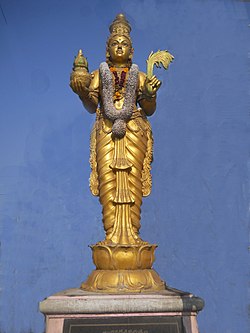Maa Telugu Thalliki
 From Wikipedia the free encyclopedia
From Wikipedia the free encyclopedia
| English: "To Our Mother Telugu" | |
|---|---|
 | |
State song of Andhra Pradesh | |
| Lyrics | Sankarambadi Sundaraachari, 1942 |
| Music | Tanguturi Suryakumari |
| Adopted | 1975[1][2] |
Maa Telugu Talliki (pronounced [maː teluɡu talliki], IAST: Mā Telugu Talliki; lit. ' "To Our Mother Telugu"') is the official song of the Indian state of Andhra Pradesh. The Telugu Thalli is portrayed as a symbol of Telugu people. Many schools and government events start with this song.
Background[edit]
It was written by Sankarambadi Sundaraachari and sung by Suryakumari[3] for the Telugu film Deena Bandhu (1942) which starred V. Nagayya but was released as a private label by the artist.
Lyrics[edit]
| Telugu | Latin script | IPA transcription | Translation |
|---|---|---|---|
మా తెలుగు తల్లికి మల్లెపూదండ | Mā telugu talliki mallepūdaṇḍa | [maː teluɡu talːiki malːepuːdaɳɖa] | A garland of Jasmines for our Mother Telugu, |
Legacy and in popular culture[edit]
The song was used in the 1976 film Alludochadu featuring Ramakrishna and Jayasudha. The song was used by N. T. Rama Rao after he launched the Telugu Desam Party during his state wide tour. The song was used in 1985 film Bullet featuring Krishnam Raju and Suhasini. It was last used in the 2010 film Leader featuring Rana Daggubati and Richa Gangopadhyay.
See also[edit]
References[edit]
- ^ "The First World Telugu Conference A Review". worldteluguconference.com. Retrieved 26 January 2024.
- ^ "Sankarambadi remembered". The Hans India. 21 July 2016.
- ^ Harpe, Bill (18 May 2005). "Surya Kumari". The Guardian. Retrieved 28 June 2019.
- ^ "Maa Telugu Thalliki". Archived from the original on 22 January 2020. Retrieved 1 August 2019.
- ^ ""మా తెలుగు తల్లికి..." రచయిత శంకరంబాడి సుందరాచారి". Tnilive.com. 13 May 2019. Retrieved 29 November 2021.